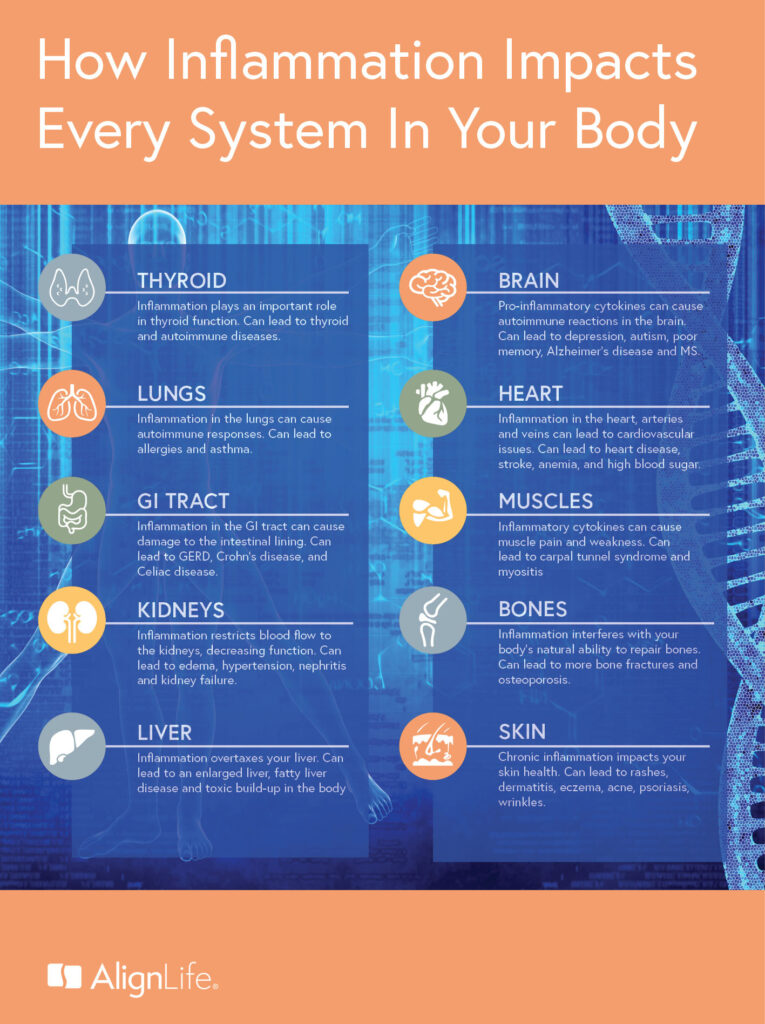Inflammation does more than make your joints hurt. It can also stop you from reaching your health goals. Here’s how to reduce inflammation in the body fast by making simple changes to the foods you eat and beyond.
If you’ve ever dealt with chronic inflammation, you know that it’s not something you want to live with long-term. Thankfully, whether you’re fighting inflammation due to an autoimmune disease, dealing with arthritis, or are an athlete trying to train to the next level, some simple lifestyle changes can help you reduce inflammation in your body fast. But first, let’s talk a little bit about what inflammation is and why it’s a concern.
What is Inflammation

Inflammation is your body’s natural response to trouble. It’s like hitting the panic button when something’s not right. Whether it’s a twisted ankle, a nasty bug, or some pesky germs, your immune system jumps into action, sending out troops to tackle the issue. The technical term for this inflammatory response is acute inflammation.
This process brings extra blood flow and immune cells to the scene, helping to patch up damage and fend off intruders. It’s all good in the short term, usually lasting a few hours or days at most. But if that alarm keeps blaring for too long—cue chronic inflammation—things can get messy.
Why Inflammation Matters
When inflammation goes beyond just a quick emergency response and becomes a lingering problem, it can mess with your health. It increases your risk factors for chronic diseases like heart disease, type 2 diabetes, chronic fatigue syndrome, blood pressure issues, and more.
So, while inflammation is a natural part of your body’s defense system, keeping it in check with healthy habits is crucial for staying in top form. Check out the many ways inflammation can wreak havoc on your body if left unchecked in this graphic:
How to Get Rid of Inflammation
1) Load up on anti-inflammatory foods.

You are what you eat, and following an anti-inflammatory diet (or Mediterranean diet) will help you reduce inflammation and the everyday aches and pains fast.
Pack your weekly meals with nutrient-dense, low-calorie foods, and be sure to make fruits, veggies, lean meats, and foods containing omega-3 fats like cold-water fish and walnuts the stars of your dishes.
Some top anti-inflammatory foods to add to your next grocery run include:
- Fatty fish (salmon, mackerel, sardines)
- Vegetables (broccoli, leafy greens, cabbage, kale, celery)
- Fruits (pineapple, cherries, oranges, strawberries, raspberries, blueberries, avocado)
- Nuts (almonds, walnuts, pistachios, Brazil nuts, pecans)
- Seeds (flax seeds, chia seeds, pumpkin seeds)
- Spices (turmeric, ginger, cinnamon, cayenne pepper, garlic).
- Bone broth
- Collagen
Be sure to avoid foods that cause added inflammation too such as fast food, fried foods, red meat, sodas, refined or processed carbs, and processed meats.

2) Control your blood sugar.
The key to controlling your blood sugar is watching your carbs. A simple way to look at this is to avoid “white” foods such as white breads, pasta, and rice, as well as anything with white sugar or flour. Opt for whole grains like brown rice, whole wheat bread, and oats instead. Also, be sure to check the packaging on your products to make sure a “whole gain” ingredient is listed first.
3) Exercise and move more.

We all know exercising on a regular basis pays off in long-term health benefits. It helps everything from reducing the risk of cardiovascular disease to improving metabolism, managing weight, and strengthening the heart, muscles, and bones. Exercise also helps reduce inflammation in the body. Now we’re seeing research that shows just how much it helps.
“Our study shows a workout session does not actually have to be intense to have anti-inflammatory effects,” lead author Suzi Hong shared with Medical News Today about their research. “Twenty minutes to half an hour of moderate exercise, including fast walking, appears to be sufficient. Feeling like a workout needs to be at a peak exertion level for a long duration can intimidate those who suffer from chronic inflammatory diseases and could greatly benefit from physical activity.”
AlignLife doctors recommend you should aim to get regular exercise (at least four to five times a week) and to make sure it includes least 30-45 minutes of moderate cardio or aerobic exercise and 10-15 minutes of weight or resistance training.
4) Lose excess weight.

Research has also proven the link between weight gain and increased inflammation in the body. In fact, a 2019 study found that C-reactive protein (CRP) levels – a key inflammatory marker in the blood – increased at the same rate as weight increased and remained until the weight was lost.
Excess weight and its corresponding inflammation can also lead to insulin and leptin resistance. Insulin is the hormone that tells your body how to use or store the sugars from carbohydrates you eat. Leptin is the hormone that tells your body when to eat (or stop eating) and when to speed up and slow down your metabolism.
As you can imagine, when both of these hormones are out of control, weight gain is inevitable and weight loss is near impossible.
5) Manage Stress

Chronic stress also adds to inflammation. Fortunately, there are numerous (and proven effective) techniques out there on how you can manage stress. Here’s a list of some of our favorites. Try out a few and see if they help you relax and release some of the tension that has been stored up.
6) Drink more water.

Water is always a magic elixir. It helps your body flush out any toxins that can be causing inflammation in your body. Aim to drink half your body weight in ounces a day. You can boost your intake by drinking a full glass when you first wake up, before you eat a meal or snack, and before bed at night.
If you find yourself getting bored with water, there are also some great alternatives that can still help you reduce inflammation.
- Fruit-infused waters are a great way to spruce your water up! >
- Green, black, and white teas as well as coffee are all high in polyphenols or plant compounds with strong anti-inflammatory effects (green tea has the highest levels).
- Smoothies packed with anti-inflammatory foods are also a great option.
- A glass of red wine is also well-known for its anti-inflammatory effects, just make sure to drink in moderation.
7) Get more Vitamin D.

Vitamin D is also linked to helping reduce inflammation in the body. Research shows that low levels of Vitamin D are linked to numerous inflammatory diseases. Increasing your Vitamin D levels either through the foods you eat, a quality Vitamin D supplement like Active-D from Aceva or getting more sunshine can help reduce inflammation in your body.
Next Step to Reducing Inflammation
Chiropractic care can also help you reduce chronic pain and inflammation! Ask your local AlignLife Chiropractor to guide you in assessing and recommending which lifestyle changes you should make to reduce inflammation in your body today. Schedule a visit today!





